The AMD 3rd Gen Ryzen Deep Dive Review: 3700X and 3900X Raising The Bar
by Andrei Frumusanu & Gavin Bonshor on July 7, 2019 9:00 AM EST** = Old results marked were performed with the original BIOS & boost behaviour as published on 7/7.
Benchmarking Performance: CPU Legacy Tests
3DPM v1: Naïve Code Variant of 3DPM v2.1
The first legacy test in the suite is the first version of our 3DPM benchmark. This is the ultimate naïve version of the code, as if it was written by scientist with no knowledge of how computer hardware, compilers, or optimization works (which in fact, it was at the start). This represents a large body of scientific simulation out in the wild, where getting the answer is more important than it being fast (getting a result in 4 days is acceptable if it’s correct, rather than sending someone away for a year to learn to code and getting the result in 5 minutes).
In this version, the only real optimization was in the compiler flags (-O2, -fp:fast), compiling it in release mode, and enabling OpenMP in the main compute loops. The loops were not configured for function size, and one of the key slowdowns is false sharing in the cache. It also has long dependency chains based on the random number generation, which leads to relatively poor performance on specific compute microarchitectures.
3DPM v1 can be downloaded with our 3DPM v2 code here: 3DPMv2.1.rar (13.0 MB)
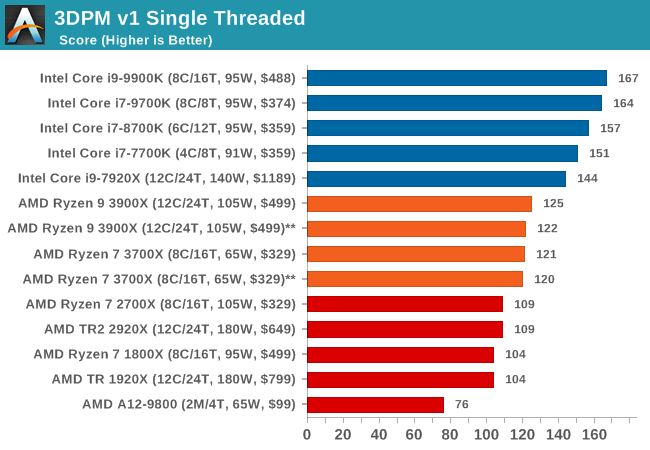
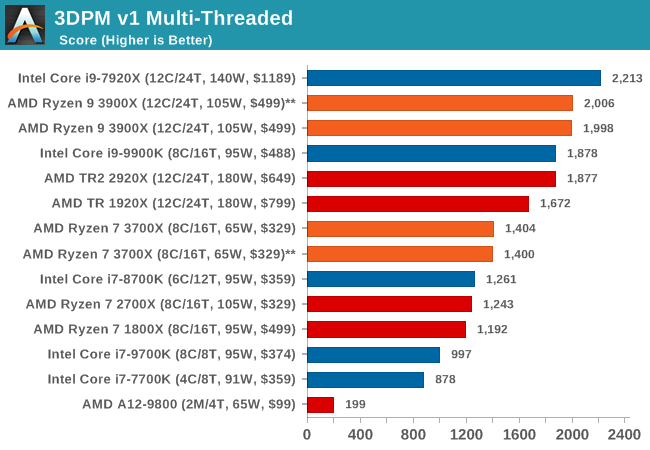
x264 HD 3.0: Older Transcode Test
This transcoding test is super old, and was used by Anand back in the day of Pentium 4 and Athlon II processors. Here a standardized 720p video is transcoded with a two-pass conversion, with the benchmark showing the frames-per-second of each pass. This benchmark is single-threaded, and between some micro-architectures we seem to actually hit an instructions-per-clock wall.
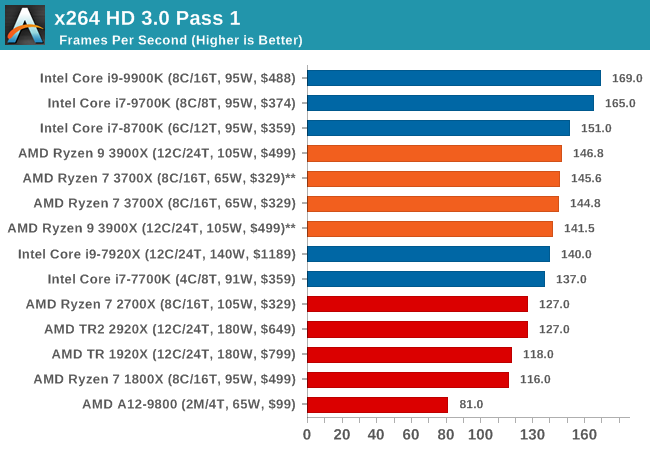
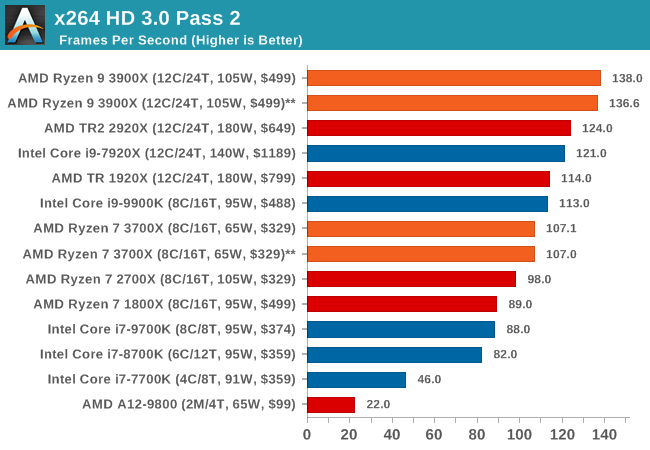
CineBench 11.5 and 10
Cinebench is a widely known benchmarking tool for measuring performance relative to MAXON's animation software Cinema 4D. Cinebench has been optimized over a decade and focuses on purely CPU horsepower, meaning if there is a discrepancy in pure throughput characteristics, Cinebench is likely to show that discrepancy. Arguably other software doesn't make use of all the tools available, so the real world relevance might purely be academic, but given our large database of data for Cinebench it seems difficult to ignore a small five minute test. We run the modern version 15 in this test, as well as the older 11.5 due to our back data.
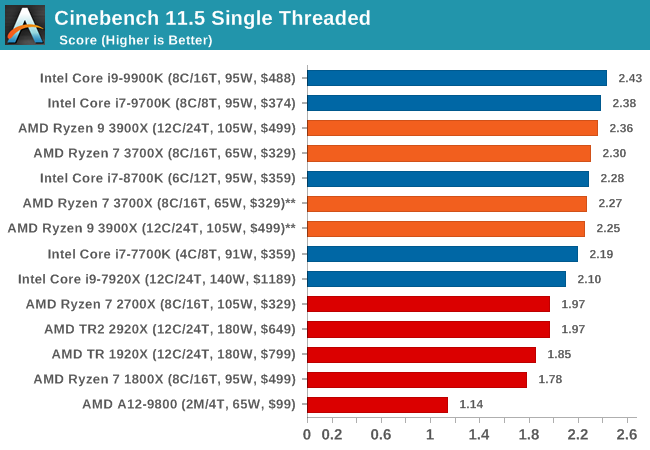
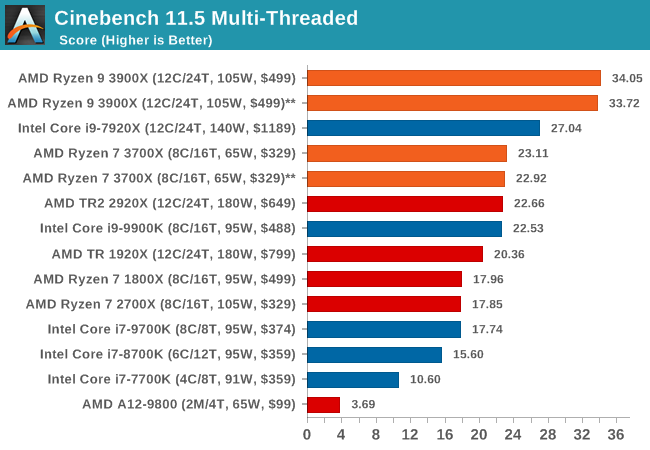










447 Comments
View All Comments
Maxiking - Tuesday, July 23, 2019 - link
I said a few times... I don't tend to buy amd products so no, I am not gonna sue anybody.And as pointed out in the video, in his German one, he works for a retailer selling prebuilt pcs.. People keep returning pcs with AMD cpus becaue they do not boost to the promised frequency. You there, there are something like laws, if you write on the box 4.6ghz, it must reach it.
You are so knowledgeable, sharp minded and analytical when comes to meaning of words and what people want to say, you should sue Intel on your own, should be easy.
Atom2 - Monday, July 29, 2019 - link
ICC compiler is 3x faster than LLVM and AVX512 is 2x faster than AVX2. And both were left out of comparison? The comparison designed purely only for the LLVM compiler users? Used by who?Rudde - Saturday, August 10, 2019 - link
ICC is proprietary afaik and Anandtech prefers open compilers. AVX512 should be found in 3DPM and shows utter demolition by the only processor that supports it (7920X).MasterE - Wednesday, August 7, 2019 - link
I considered going with the Ryzen 9 3900X chip and an x570 motherboard for a new rendering system but since these chips aren't available for less than $820+ anywhere, I guess I'll be back to either the threadripper or Intel 9000+ series. There is simply no way I'm paying that kind of price for a chip with a Manufacters Suggested Retail Price of $499.gglaw - Friday, August 23, 2019 - link
@Andrei - I was just digging through reviews again before biting the bullet on a 3900X and one of the big questions that is not agreed upon in the tech community is gaming performance for PBO vs all-core overclock, yet you only run 2 benches on the overclocked settings. How can a review be complete with only 2 benches run, neither related to gaming? In a PURELY single threaded scenario PBO gives a tiny 2.X percent increase in single threaded Cinebench. This indicates to me that it is not sustaining the max 4.6 on a single core or it would have scaled better, so it may not be really comparing 4.6 vs 4.3 even for single threaded performance. Almost all recent game engines can at least utilize 4 threads, so I feel your exact same test run through the gaming suite would have shown a consistent winner with 4.3 all-core OC vs PBO. And in heavily threaded scenarios the gap would keep growing larger, but specifically in today's GAMES, especially if you consider very few of us have 0 background activity, all-core OC would hands-down win is my guess, but we could have better evidence of this if you could run a complete benchmarking suite. (unless I'm blind and missed it, in case my apologies :)I've been messing around with a 3700X, and even with a 14cm Noctua cooling it, it does not sustain max allowed boost on even a single core with PBO which is another thing I wish you touched on more. During your testing do you monitor the boost speeds and what percent of the time it can stay at the max boost over XX minutes?
Maxiking - Monday, August 26, 2019 - link
Veni, vidi viciYeah, I was right.
I would like to thank my family for all the support I have received whilst fighting amd fanboys.
It was difficult, sometimes I was seriously thinking about giving up but the truth can not be stopped!
The AMD fraud has been confirmed.
https://www.reddit.com/r/pcgaming/comments/cusn2t/...
Ninjawithagun - Thursday, October 10, 2019 - link
Now all you have to do is have all these benchmarks ran again after applying the 1.0.0.3. ABBA BIOS update ;-)quadibloc - Tuesday, November 12, 2019 - link
I am confused by the diagram of the current used by individual cores as the number of threads is increased. Since SMT doesn't double the performance of a core, on the 3900X, for example, shouldn't the number of cores in use increase to all 12 for the first 12 threads, one core for each thread, with all cores then remaining in use as the number of threads continues to increase to 24?Or is it just that this chart represents power consumption under a particular setting that minimizes the number of cores in use, and other settings that maximize performance are also possible?
SjLeonardo - Saturday, December 14, 2019 - link
Core and uncore get supplied by different VRMs, right?Parkab0y - Sunday, October 4, 2020 - link
I really want to see something like this about zen3 5000